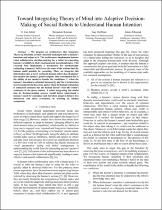 ResearchSpace
ResearchSpace
Toward integrating Theory of Mind into adaptive decision-making of social robots to understand human intention
JavaScript is disabled for your browser. Some features of this site may not work without it.
- ResearchSpace
- →
- Research Publications/Outputs
- →
- Conference Publications
- →
- View Item
| dc.contributor.author |
Görür, OC

|
|
| dc.contributor.author |
Rosman, Benjamin S

|
|
| dc.contributor.author |
Hoffman, G

|
|
| dc.contributor.author |
Albayrak, S

|
|
| dc.date.accessioned | 2017-10-10T10:29:27Z | |
| dc.date.available | 2017-10-10T10:29:27Z | |
| dc.date.issued | 2017-03 | |
| dc.identifier.citation | Görür, O.C., Rosman, B.S., Hoffman, G. et al. 2017. Toward integrating Theory of Mind into adaptive decision-making of social robots to understand human intention. Workshop on the Role of Intentions in Human-Robot Interaction at the International Conference on Human-Robot Interaction, 6 March 2017, Vienna, Austria | en_US |
| dc.identifier.uri | http://intentions.xyz/wp-content/uploads/2017/01/Gorur.gorur_HRI17_wsInt_camReady.pdf | |
| dc.identifier.uri | https://www.researchgate.net/publication/314238744_Toward_Integrating_Theory_of_Mind_into_Adaptive_Decision-_Making_of_Social_Robots_to_Understand_Human_Intention | |
| dc.identifier.uri | http://hdl.handle.net/10204/9653 | |
| dc.description | Paper presented at Workshop on the Role of Intentions in Human-Robot Interaction at the International Conference on Human-Robot Interaction, 6 March 2017, Vienna, Austria | en_US |
| dc.description.abstract | We propose an architecture that integrates Theory of Mind into a robot’s decision-making to infer a human’s intention and adapt to it. The architecture implements humanrobot collaborative decision-making for a robot incorporating human variability in their emotional and intentional states. This research first implements a mechanism for stochastically estimating a human’s belief over the state of the actions that the human could possibly be executing. Then, we integrate this information into a novel stochastic human-robot shared planner that models the human’s preferred plan. Our contribution lies in the ability of our model to handle the conditions: 1) when the human’s intention is estimated incorrectly and the true intention may be unknown to the robot, and 2) when the human’s intention is estimated correctly but the human doesn’t want the robot’s assistance in the given context. A robot integrating this model into its decision-making process would better understand a human’s need for assistance and therefore adapt to behave less intrusively and more reasonably in assisting its human companion. | en_US |
| dc.language.iso | en | en_US |
| dc.relation.ispartofseries | Worklist;19463 | |
| dc.subject | Theory of mind | en_US |
| dc.subject | Social robots | en_US |
| dc.subject | Human intention understanding | en_US |
| dc.title | Toward integrating Theory of Mind into adaptive decision-making of social robots to understand human intention | en_US |
| dc.type | Conference Presentation | en_US |
| dc.identifier.apacitation | Görür, O., Rosman, B. S., Hoffman, G., & Albayrak, S. (2017). Toward integrating Theory of Mind into adaptive decision-making of social robots to understand human intention. http://hdl.handle.net/10204/9653 | en_ZA |
| dc.identifier.chicagocitation | Görür, OC, Benjamin S Rosman, G Hoffman, and S Albayrak. "Toward integrating Theory of Mind into adaptive decision-making of social robots to understand human intention." (2017): http://hdl.handle.net/10204/9653 | en_ZA |
| dc.identifier.vancouvercitation | Görür O, Rosman BS, Hoffman G, Albayrak S, Toward integrating Theory of Mind into adaptive decision-making of social robots to understand human intention; 2017. http://hdl.handle.net/10204/9653 . | en_ZA |
| dc.identifier.ris | TY - Conference Presentation AU - Görür, OC AU - Rosman, Benjamin S AU - Hoffman, G AU - Albayrak, S AB - We propose an architecture that integrates Theory of Mind into a robot’s decision-making to infer a human’s intention and adapt to it. The architecture implements humanrobot collaborative decision-making for a robot incorporating human variability in their emotional and intentional states. This research first implements a mechanism for stochastically estimating a human’s belief over the state of the actions that the human could possibly be executing. Then, we integrate this information into a novel stochastic human-robot shared planner that models the human’s preferred plan. Our contribution lies in the ability of our model to handle the conditions: 1) when the human’s intention is estimated incorrectly and the true intention may be unknown to the robot, and 2) when the human’s intention is estimated correctly but the human doesn’t want the robot’s assistance in the given context. A robot integrating this model into its decision-making process would better understand a human’s need for assistance and therefore adapt to behave less intrusively and more reasonably in assisting its human companion. DA - 2017-03 DB - ResearchSpace DP - CSIR KW - Theory of mind KW - Social robots KW - Human intention understanding LK - https://researchspace.csir.co.za PY - 2017 T1 - Toward integrating Theory of Mind into adaptive decision-making of social robots to understand human intention TI - Toward integrating Theory of Mind into adaptive decision-making of social robots to understand human intention UR - http://hdl.handle.net/10204/9653 ER - | en_ZA |





